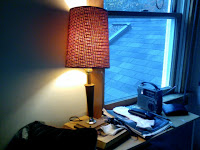Whenever we do what we are doing, we are praying. Paying attention to our life is having faith in life. Faith is attention seeking insight.
We wonder about life. We wonder about God. We wander about life. We wander about God.
Saturday morning practice today included silent sitting, reading (today from Shambhala Sun article by Karen Maezen Miller: “Do Dishes, Rake Leaves -- And Don’t Forget the Endless Loads of Laundry”), followed by a circle reflection by each attending, then metta blessing. It was a lovely morning and lovely practice.
This afternoon, rowing around Curtis and out around R2 bell buoy. Not a ripple. Slightest of swells. Slack tide. Rokie in stern. No boats in outer harbor. Only mooring balls to bump into. Warm afternoon. We meet Mannings just north of island, coming alongside -- they in their large dory, I in Anna’s good-sized peapod. Rokie jumps into dory, greets Sam and Susan fore to aft, then jumps back to peapod to resume our passage. Three sets of oars pull away from the rendezvous. Saskia is at wharf taking in the warm sun in wheelchair a month into her broken ankle.
We pray just by being in the world. Our very being is prayer. God is the open expanse of wholeness within which all things live and breathe and have their being. To acknowledge this reality is what some call gratefulness, some call the contemplative life, and some call prayer.
Vespers is spoken in quiet kitchen. Kali calls and does healing silence over phone with Saskia.
A Ken Follett series on Netflix, The Pillars of the Earth, dark and brooding treachery of court and church in middle ages. Power, ambition, and greed seem a staple of human nature. We pray, if we do, because it is a staple. Prayer is a fast. Or so it was. Reducing our obsessions.
But now, prayer is not wanting anything. Not from God, not from man, not from earth.
Left bereft, we pray to see through the emptiness what is permeating the emptiness. There's nothing there.
We are this nothingness seeking what we are.
This prayer is the longing of the presence of God to realize itself/himself/herself in the self-emptying place of receptivity and weakness.The Northumbrian Community of Ireland uses the words availability and vulnerability.
Names of the unified mind are
Buddha-nature,
True suchness, the hidden essence,
The pure spiritual body,
The pedestal of awareness,
The innocent, universal round mirrorlike knowledge,
The open source, the ultimate truth,
And pure consciousness.
The enlightened ones of the past, present, and future,
And all of their discourses,
Are all in your fundamental nature, inherently complete.
You do not need to seek,
But you must save yourself;
No one can do it for you.- Xuefeng (822–908)
I left two pennies on base of bobbing bell buoy in the bay.
You never know who might need change.


